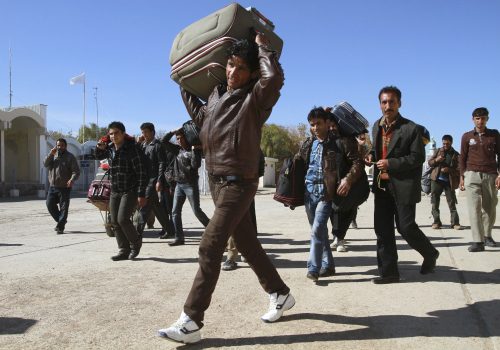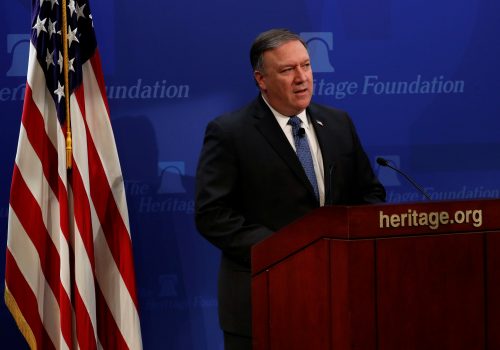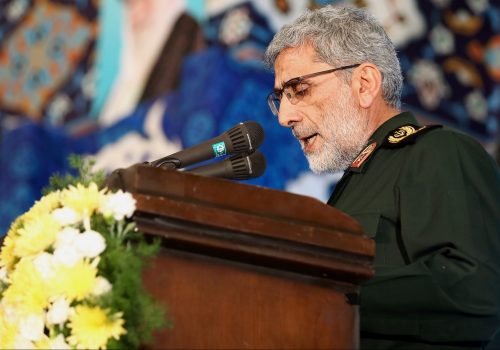Iran and the US ‘meet’ again over Afghanistan
In an administration short on diplomatic talent, Zalmay Khalilzad stands out.
His title is US Special Representative for Afghanistan Reconciliation and he is charged with extricating the United States’ military presence in that country. Tangentially, Khalilzad’s deep background as a multilingual former ambassador to Afghanistan, Iraq, and the United Nations—and his nature as an inveterate schmoozer—have put him in a position to revive US diplomatic engagement with Iran and to help de-escalate what had been a dangerous rise in tensions.
Recently, under United Nations (UN) auspices, there was a meeting of something called the “Six Plus Two.” Created after the Taliban seized control of most of Afghanistan in 1996, this format brings together the six neighbors of Afghanistan, Russia, and the United States to discuss how to stabilize Afghanistan.
In a digital chat with the Atlantic Council on May 20, Rosemary DiCarlo, UN Undersecretary General for Political and Peace-building Affairs, confirmed that Khalilzad had been present at a recent virtual Six Plus Two meeting, along with diplomats from Russia, Iran, and Afghanistan’s neighbors. She noted that this was a “unique” convening of American and Iranian officials at a time when other direct channels appear shut.
In the late 1990s, this format was an important venue for US-Iran interaction in the absence of formal diplomatic relations. Both countries used the meetings to send signals to each other and Secretary of State Madeleine Albright even attended a session in 1998, hoping to encounter her Iranian counterpart. She eventually did in 2000.
After the terrorist attacks of September 11, 2001, the multilateral meetings morphed into unadvertised bilateral US-Iran talks about how to stabilize Afghanistan, deal with al-Qaeda detainees, and, finally, discuss the run-up to the US invasion of Iraq. More than a dozen meetings were held from the fall of 2001 to May 2003 over potato chips and non-alcoholic drinks at hotels in Geneva and Paris. Ryan Crocker, a veteran US diplomat, led the sessions before Khalilzad, a senior director on the White House National Security Council, at the time, took over. His Iranian counterpart was Mohammad Javad Zarif, a deputy foreign minister who was soon to become Iran’s ambassador to the UN, and who is now Iran’s foreign minister.
Khalilzad, an Afghan native who went on to become the US ambassador to Afghanistan, Iraq, and the UN, has used his fluent Dari—a close cousin of Persian—to chat with Iranian counterparts in a variety of settings. He recognized then. as now, that Iran has enormous capacity to help or hinder the political stability of its neighbors and, thus, advance or retard US interests in the Middle East.
One of the many flaws of the Trump administration’s heavy-handed approach toward Tehran is that it has sacrificed the interests of Iran’s neighbors in the pursuit of “maximum pressure.” Countries, such as Afghanistan and Iraq, need to trade with their large neighbor in order to be successful. Consequently, sanctions reimposed by the US—after they quit the Iran nuclear deal two years ago—have hurt Iran’s neighbors and complicated their relations with the United States.
The US decision, in May 2019, to impose a total embargo on the sale of Iranian oil provoked a sharp rise in tensions in and around the Persian Gulf. This included attacks by Iran-backed Iraqi militias on US forces in Iraq, which prompted the US assassination of Quds Force commander Qasem Soleimani on January 3. Iran retaliated, directly, against a base where US troops were stationed, causing mild to severe brain injuries to one hundred Americans. Another spasm of attacks occurred in March, leading to the death of two more Americans and a British citizen, as well as three Iraqi soldiers, an Iraqi civilian, and several militia members.
In recent weeks, however, tensions appear to have abated, somewhat, in Iraq. Iran gave a green light to the nomination of Iraq’s latest prime minister, Mustafa al-Kadhimi, even though he is considered pro-US to some extent and was intelligence minister when Soleimani was assassinated.
Furthermore, DiCarlo said Iran had been helpful in convincing squabbling factions in Afghanistan’s government to reach an agreement on a joint committee to negotiate with the Taliban, with whom Khalilzad has forged a tentative pact. “Iran is now playing a constructive role regarding the Houthis” in Yemen, DiCarlo added, without providing details.
The coronavirus, which has struck Iran hard, may account, in part, for Iran’s new reasonableness. Tehran also may not want to antagonize the US in advance of presidential elections that could oust Trump and, with him, the “maximum pressure” campaign. Iran seeks a US military withdrawal from the entire region and has always played a longer game than the ones designed by revolving American administrations. Iran has also shown a willingness to engage with the US when the time and venue have been right. The Six Plus Two proved useful in that regard two decades ago and could do so, again, especially, with a diplomat like Khalilzad at the table.
Barbara Slavin is director of the Future of Iran Initiative at the Atlantic Council. Follow her on Twitter: @BarbaraSlavin1.
Image: Afghan President Ashraf Ghani and Abdullah Abdullah, chairman of the High Council for National Reconciliation, meet with U.S. Special Representative for Afghanistan Zalmay Khalilzad, in Kabul, Afghanistan, May 20, 2020. Afghan Presidential Palace/Handout via REUTERS


